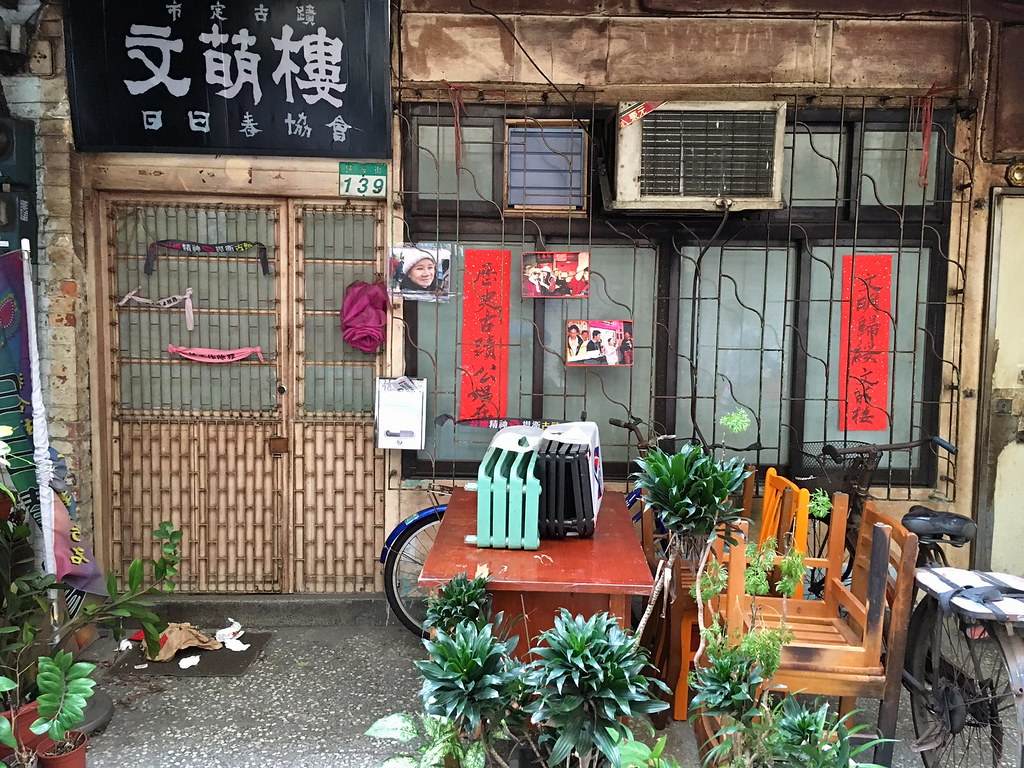
So this past Sunday, despite the crap weather, we decided to get some exercise and hang out in a part of Taipei I love, but don't get to return to often: Datong/Dadaocheng. I have a 2-volume book kicking around called Historical Sights in Taipei that I often use to determine landmarks by which I plan my urban roving, and Brendan and I came across an entry I was quite curious about: the Wen Meng House (文萌樓) at #139 Guisui Street (歸綏街), just west of Ningxia Road (Guisui is a little bit north of Minsheng). It's closest to MRT Shuanglian, and you can get there by walking through a fairly atmospheric old warren of streets if you stay off the main roads - though in this 'hood, even the main roads have crumbling colonial architecture.
The Wen Meng House was apparently opened as a municipal brothel in the 1950s - back when sex work was legal in Taiwan. It was closed in the late 1990s when sex work became criminalized, but the women of COSWAS (a sex worker association) are fighting to keep it open as a historical site and small museum. You can read more about it here.
That article was from 2012, and writing from 2016, I can say the building is still around and still marked as a historical brothel, so it seems no final decision has been reached on the fate of the property. It is, however, locked and nobody is around to let visitors in. There is an active shrine/temple next door but I didn't want to ask, though in this country I'm not so sure a temple would be morally opposed to sex work. They do have sexy temple dancers, after all.
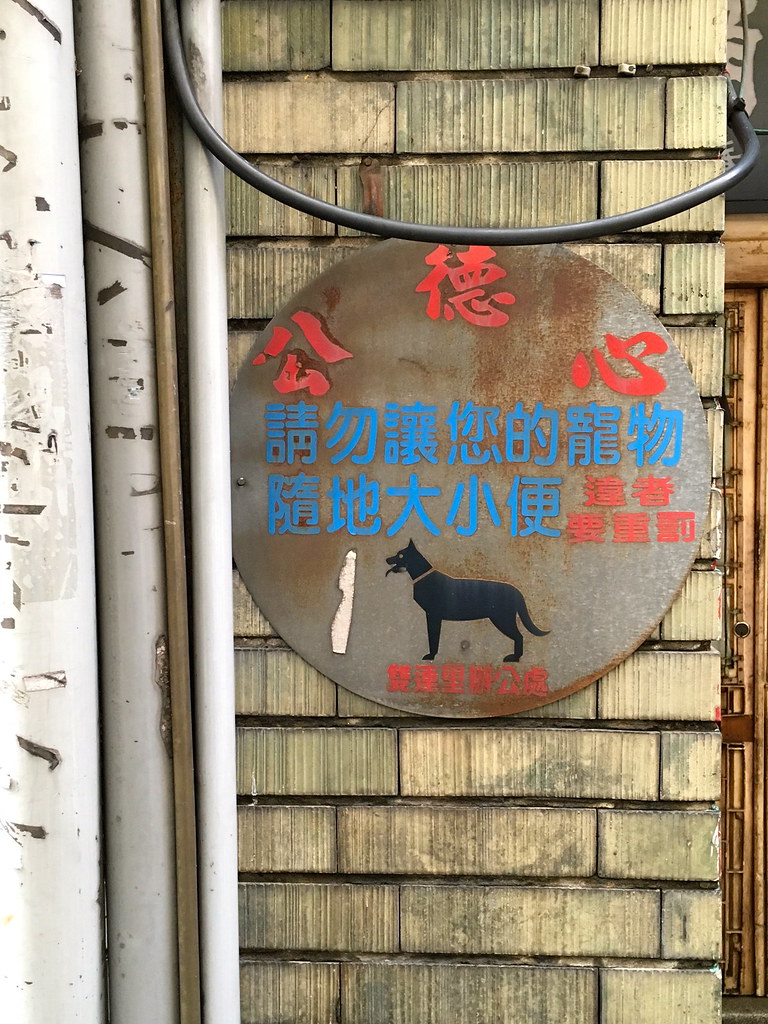
As a sex-positive person and pro-historical preservation urban dweller, I obviously side with the women trying to preserve the site. This is an important part of their history, and is one of the things that makes an urban place more human - by remembering how things were in years gone by as well as acknowledging that sex work, well, exists. It has always existed and will always exist.
Though obviously I acknowledge the rampant exploitation in the sex work industry, and am well aware that a huge percentage of prostitutes are exploited or enslaved, I'm not in theory opposed to legal sex work provided by unexploited escorts of any gender, and legalizing it would make it easier to find and punish traffickers.
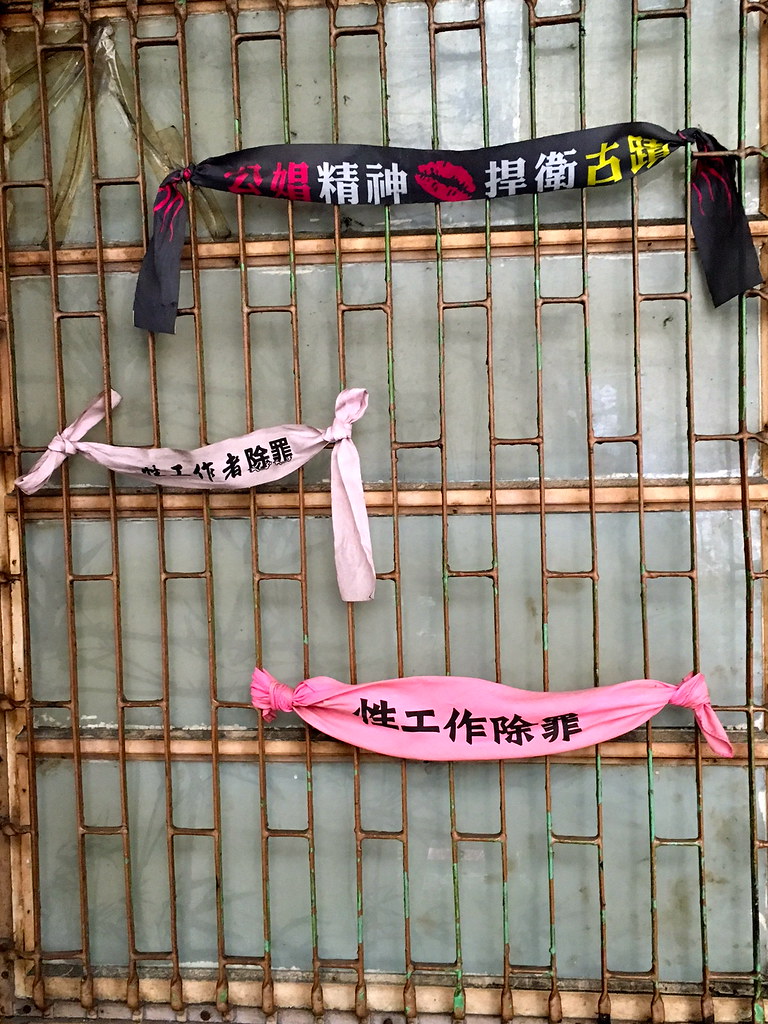
The bandanas tied to the door say "pardon sex work", and I assume the photos below are of the press conferences and political activities of the sex worker association as they fight to preserve the property. Godspeed!
I do view this as a women's issue, and an issue of women's rights. Not only should sex work not be stigmatized or penalized (though traffickers certainly should be), but women should be free to do what they want with their bodies - we all should, in fact! If that means selling sex for money and that's what they want to do, let them do it, regulate it, tax it, protect the workers who choose to engage in it, and otherwise, stay out of the bedrooms of others.
And I do think this is possible in Taiwan - first of all, it's less controversial than the "comfort women museum" (which despite controversy I actually support - women's stories too often get shunted to the side, especially if they are doing something others find 'unsavory' such as sex work - puppets get their own museum but not women who were legitimately forced into sex slavery?) And secondly, as I've explored in the past, Taiwan is not the sheer bastion of conservatism that many believe it to be. Commercial sex work was legal until 1997 after all.
And by all means, let the women have their historic site!
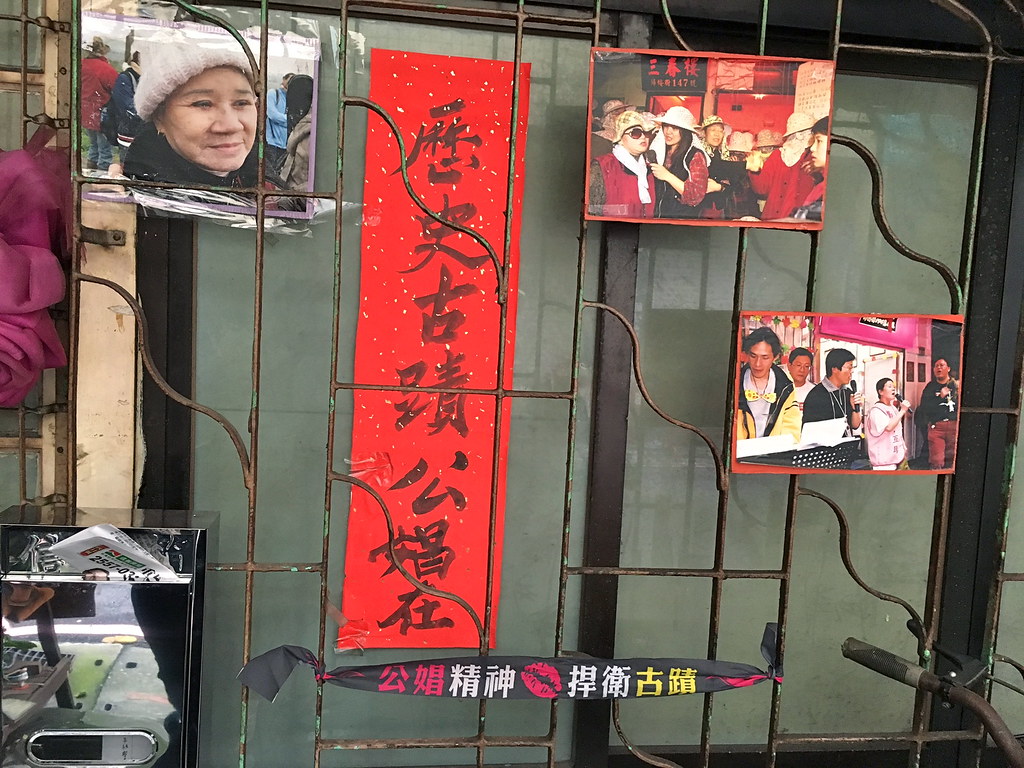
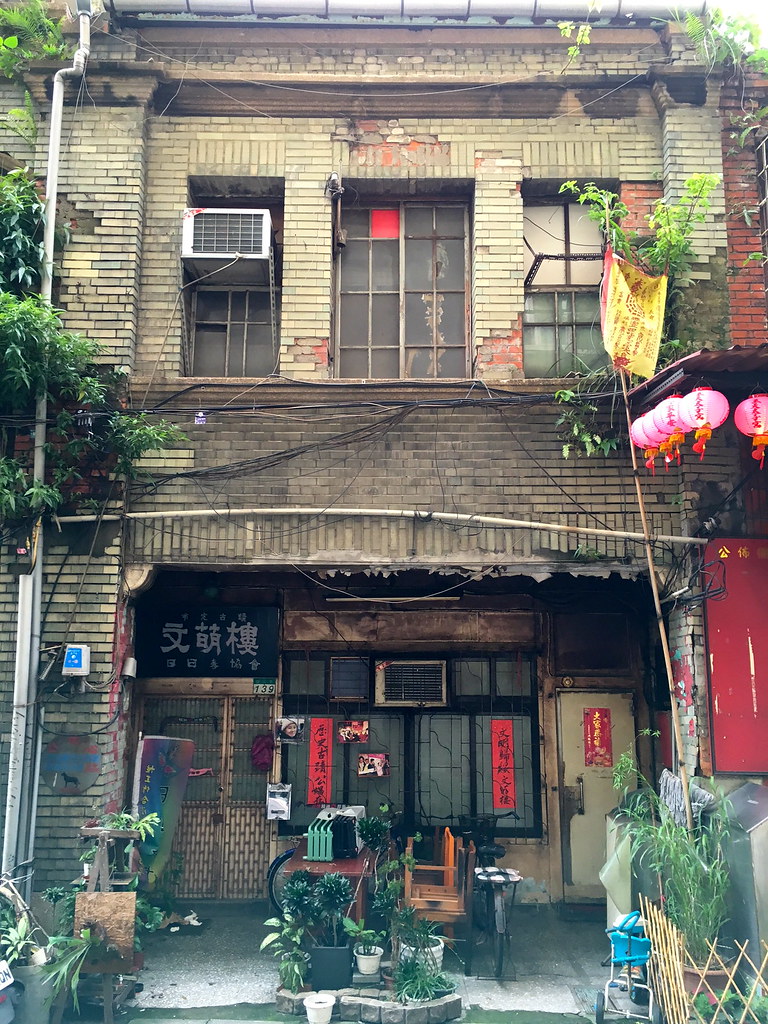
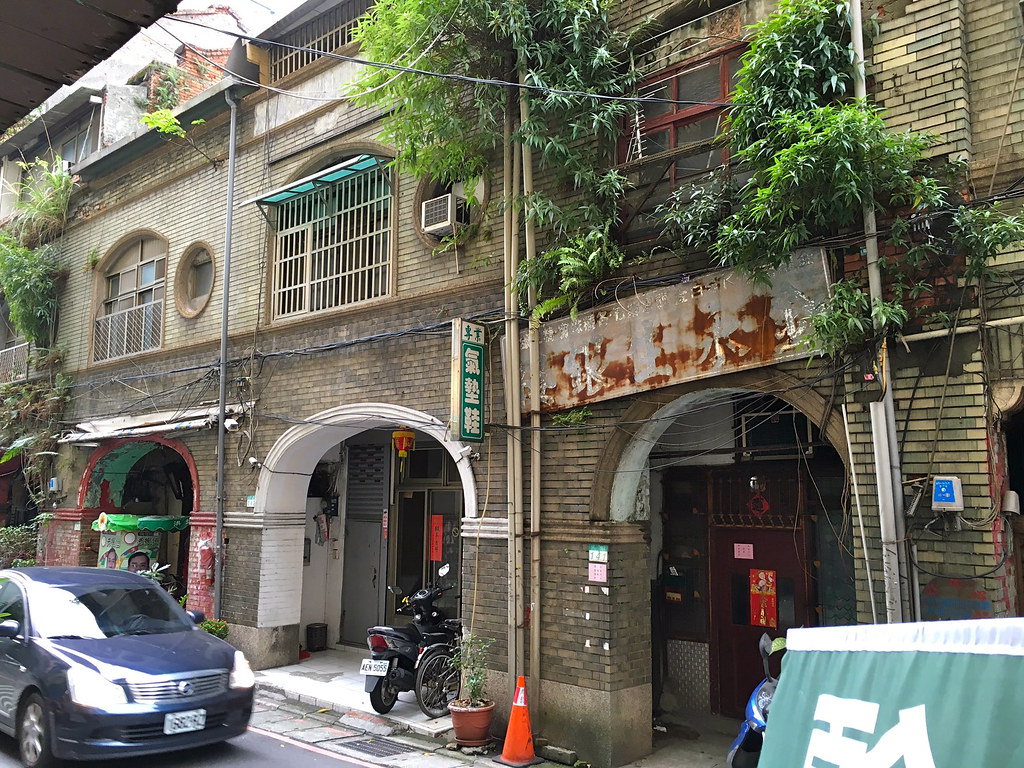
Historical Sights in Taipei, by the way, has a hilariously awkward English rundown of the site:
The indoor compartment or layout of this well-preserved house also reflects the spacial needs and functions of the early-time sex business with the particular atmosphere of a public whorehouse still emanating.
Great, except I wouldn't know what the atmosphere of a public whorehouse is? And if you look over to the Chinese, it gives you the Chinese word for, specifically, a public whorehouse (公娼館)...did not know that was a word in Chinese. Nice.
Anyway, just wandering up from Shuanglian along Wanquan (完全街) Street and assorted lanes yields all sorts of interesting sights of a slightly crumbly, gritty neighborhood:
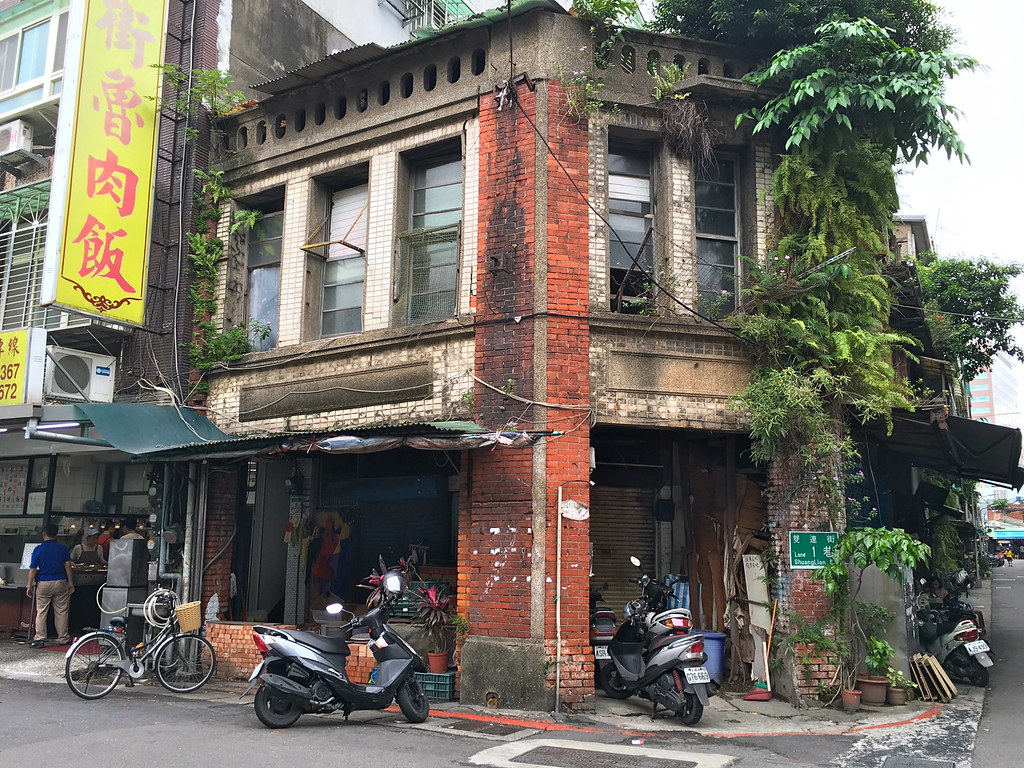
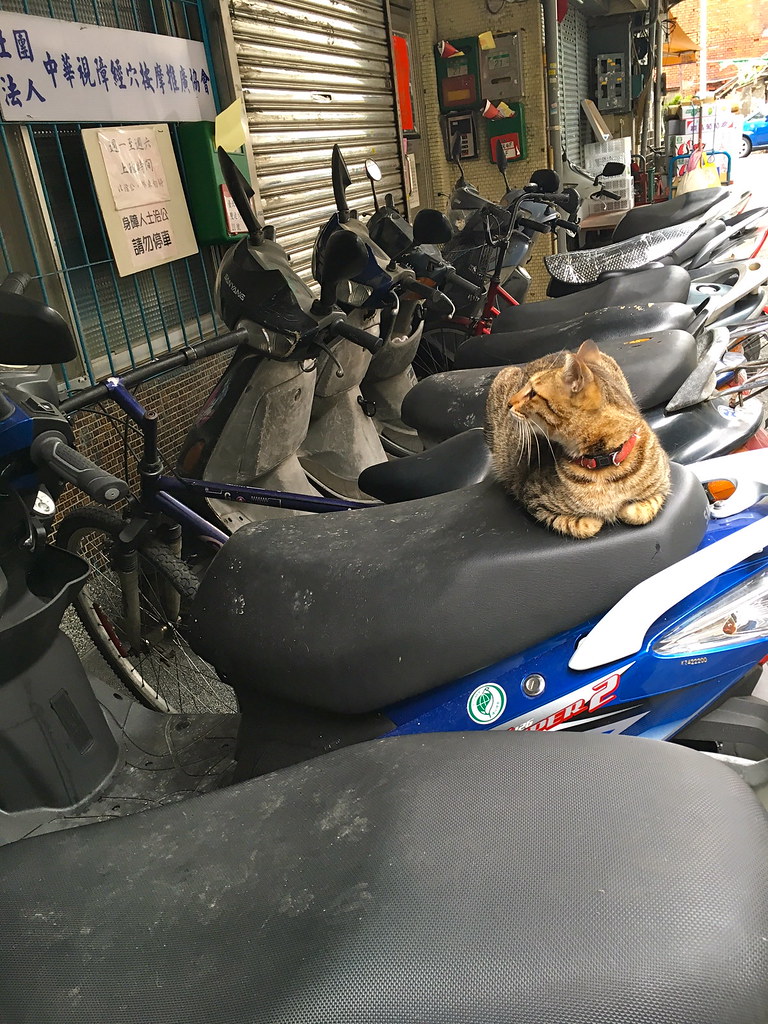
And some tiny alleys lead to interesting things indeed, including antique stone tools in private courtyards (photo taken with permission of owners but not their angry little dog):

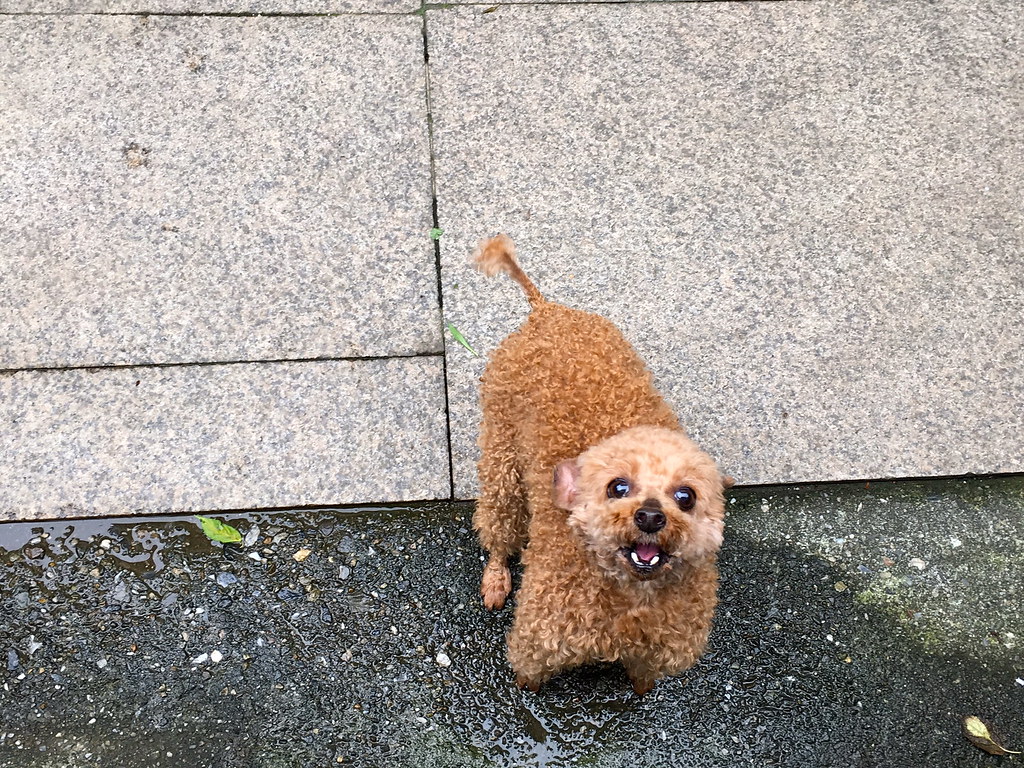
...and cool syncretic temples that feel kinda Dao and also kinda Buddhist:
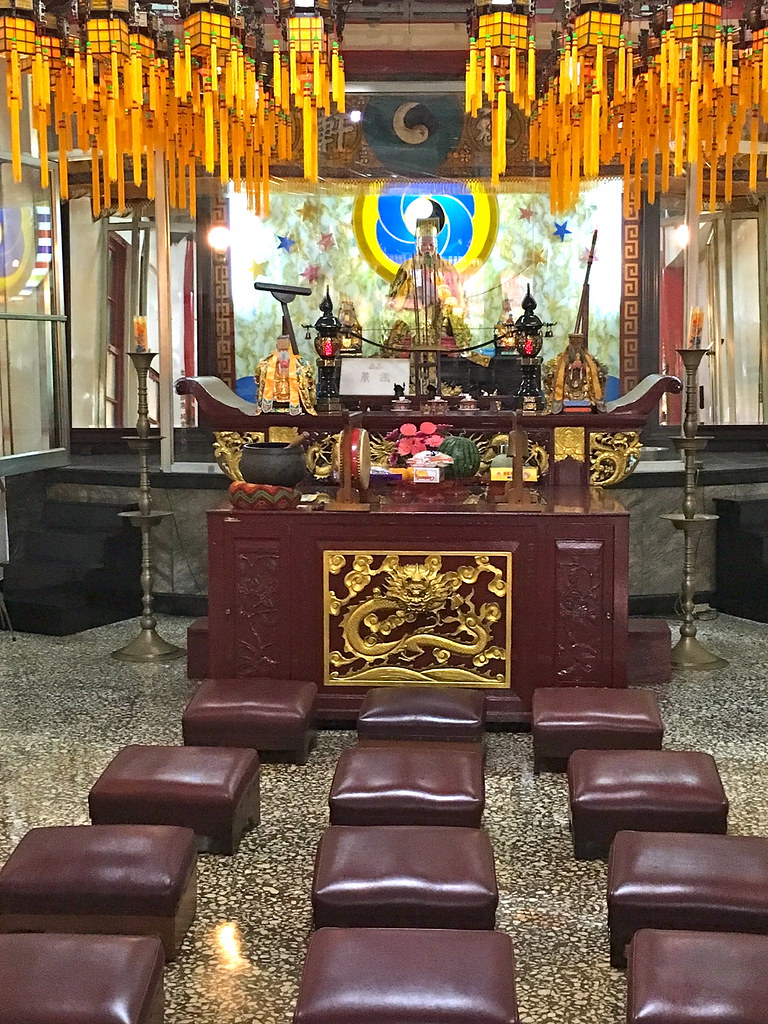
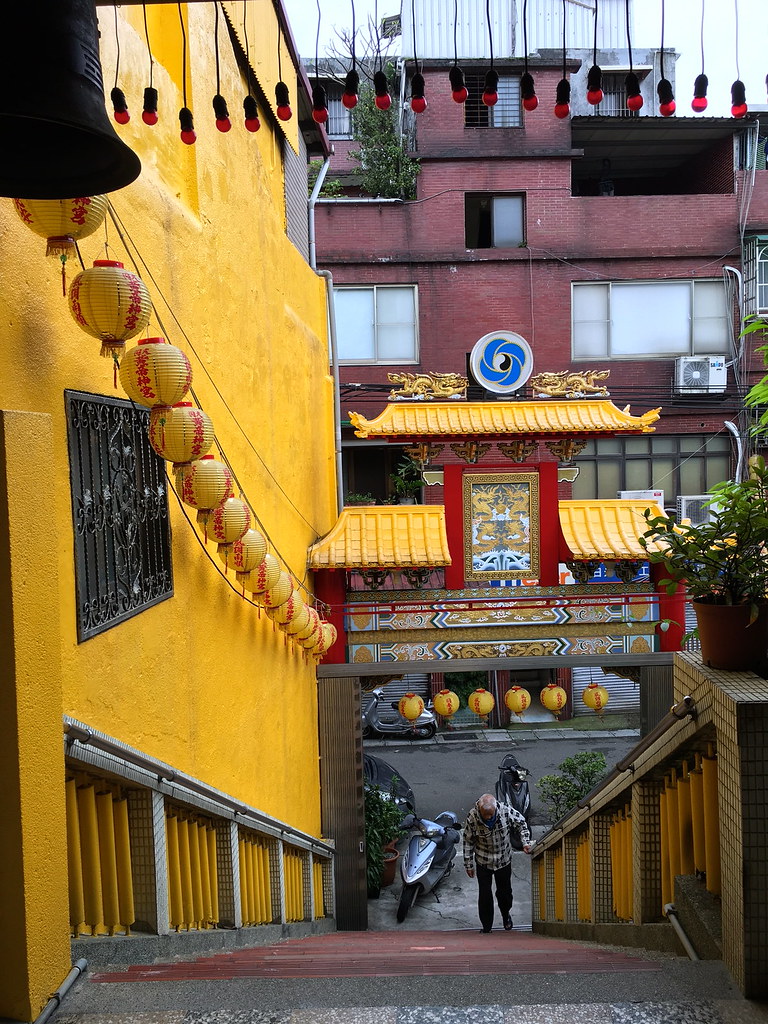
...and I thought I was the only Taipei resident to have a Chen Chu spring scroll (I have one from the year of the horse, with Chen riding a bicycle, which those who know what it would mean for Chen to be depicted riding a horse - perhaps with stirrups - might find as a missed opportunity, albeit purposely so). Chen Chu is the well-liked mayor of Kaohsiung, not Taipei!
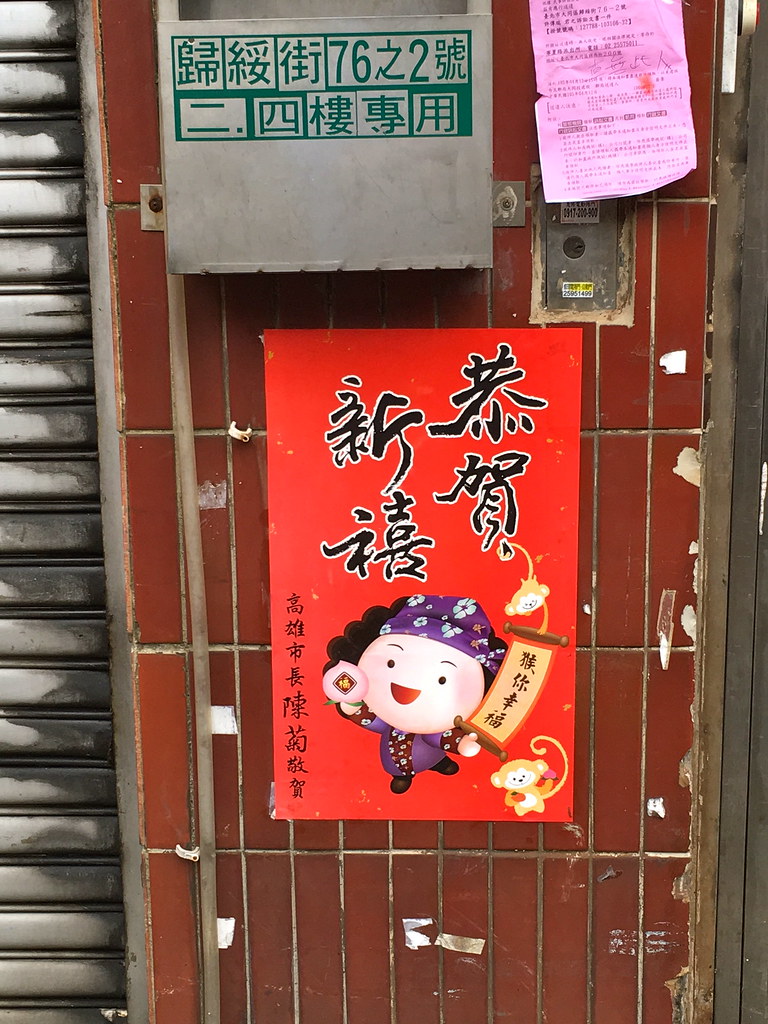
By the way, I don't have one for year of the monkey. If any Kaohsiung resident has one lying about that they want to send to me...
I also liked this lovely hand-painted sign:
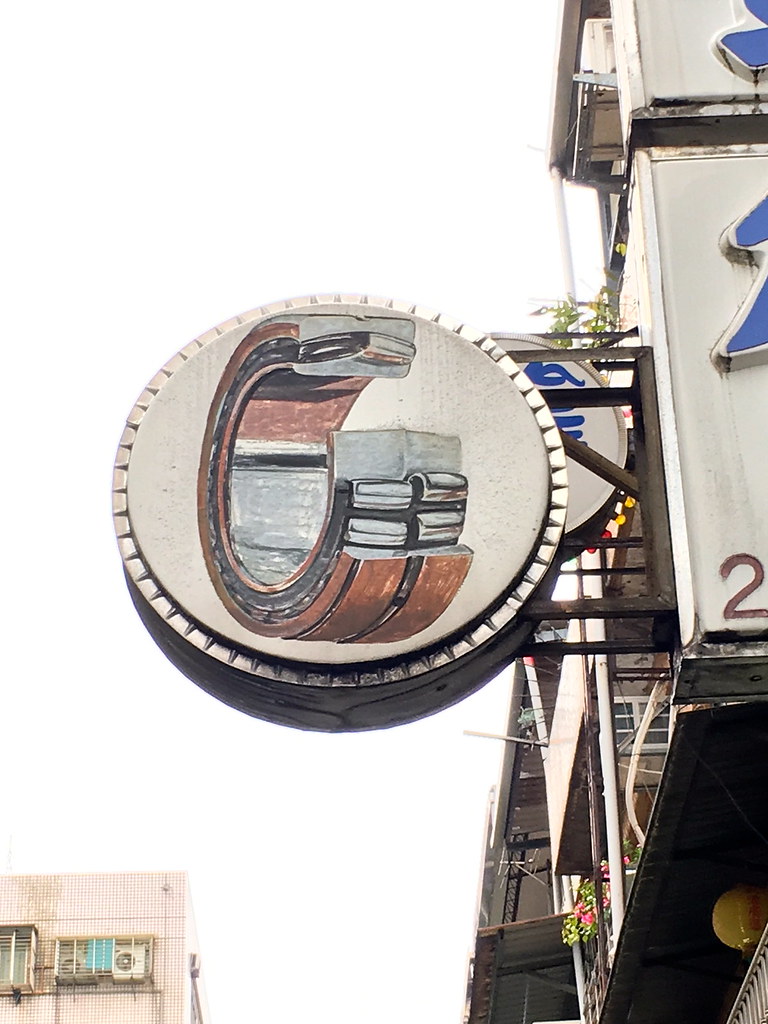
Sunflower sympathies run deep in Datong - Mr. Hong here was just one of several campaign posters and banners we saw evoking the symbols of the 2014 student movement that occupied the legislature for over two weeks. The actual student activists are not necessarily comfortable with this association or possible appropriation of their name by DPP candidates (I have no idea how close Mr. Hong here is to the student movement).
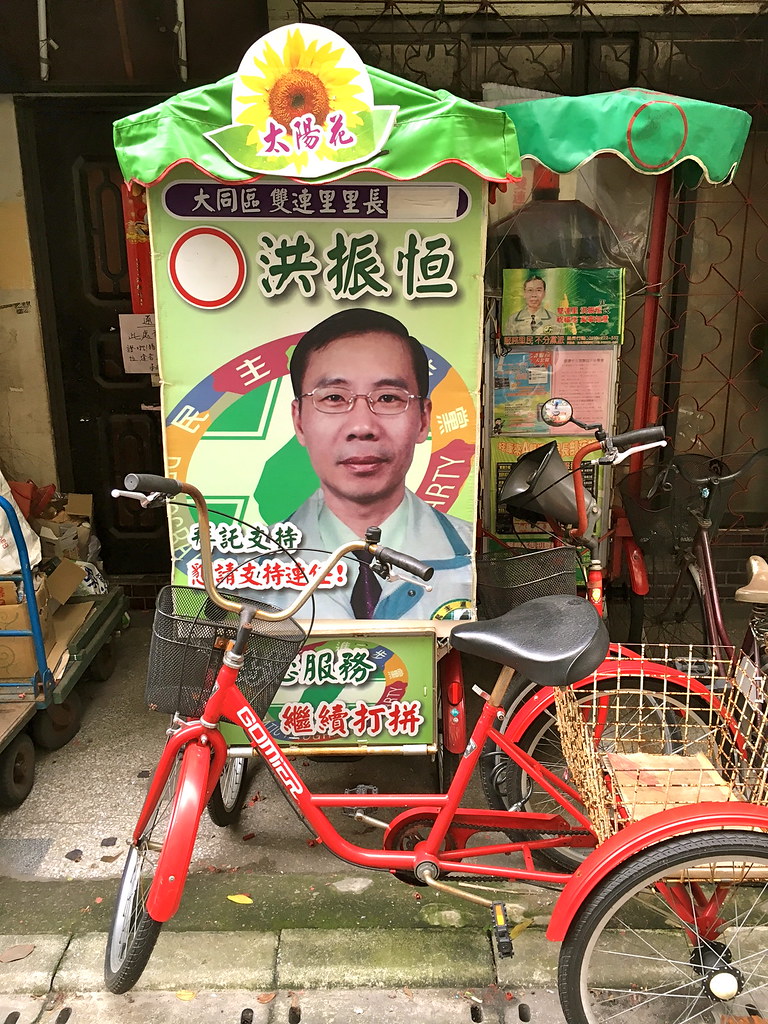
...and Datong wouldn't be Datong without its weird little asides:
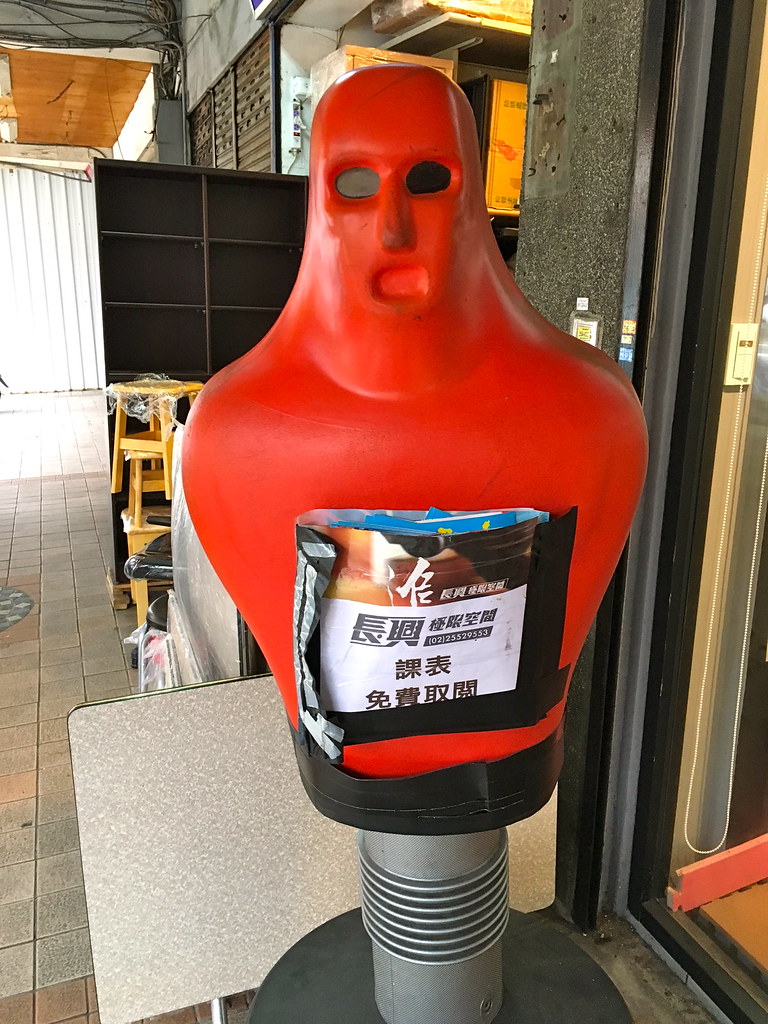
There are legit other sights too, if you want to walk around the neighborhood. Further north along Chongqing you'll come to this old facade, with an ugly building behind it. The facade itself seems to hold a Starbucks, which I gotta say is a pretty cool Starbucks...for a Starbucks:
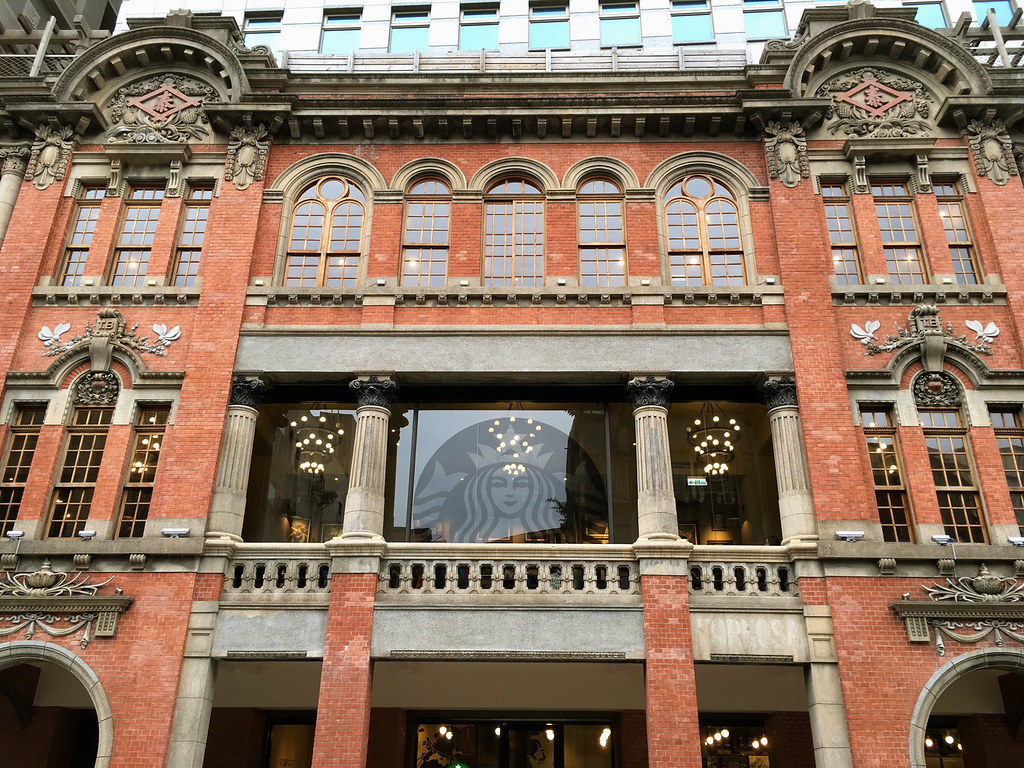
...and a turn onto Ganzhou Street will lead you to a Presbyterian church built in the early 20th century, with an ugly-as-actual-sin newer church attached behind it like a tumor that has grown larger than its host. The address is #40 甘州街.
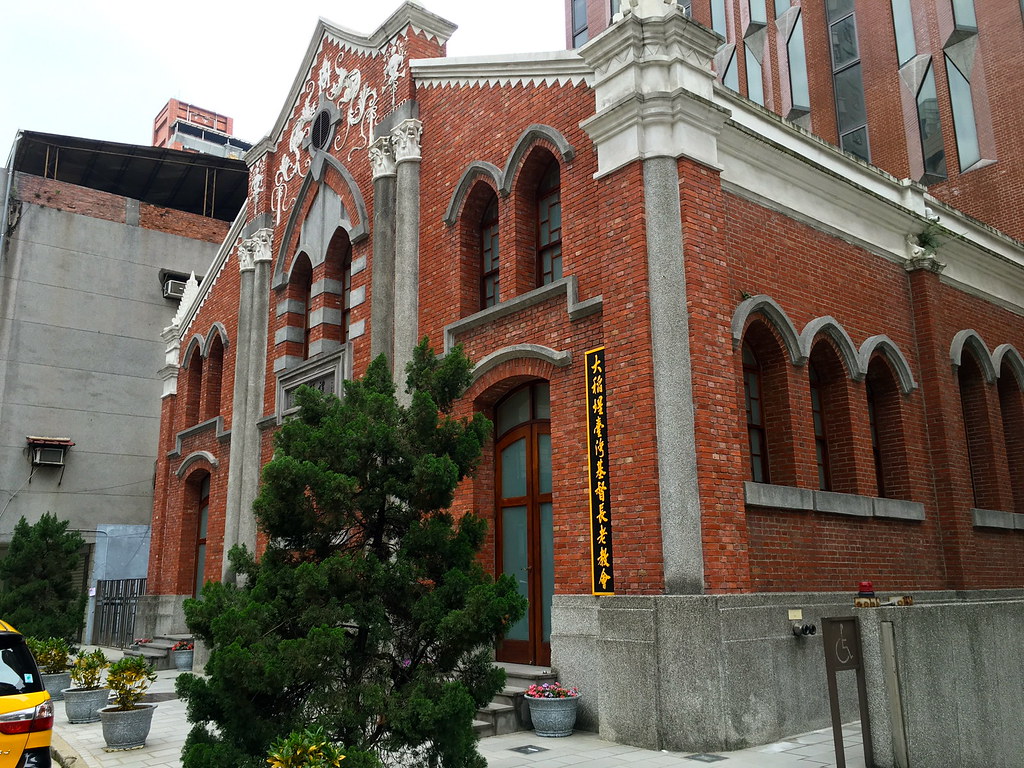
And you'll pass the requisite temples and shrines, of course. This area is also quite near a well-known Earth God temple you may want to stop at.
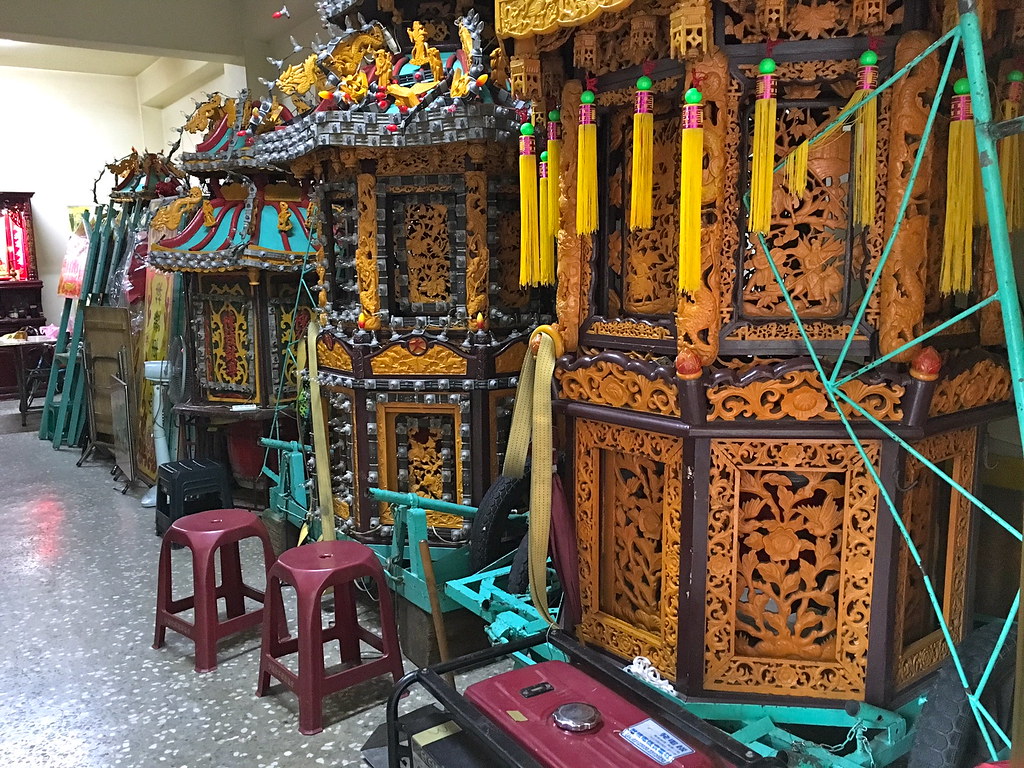
If you want to head westward, to the very end of Taipei, walk back to Guisui Street (a bit to the south of Ganzhou) and take it all the way to Lane 303, which is quite literally the last tiny little lane before Huanhe Road, the seawall, and the river delineating the city limits. Turn right and you'll reach the Koo family mansion at #9 Lane 303 Guisui Street, which is now a kindergarten. This was built back when Danshui River trade was much bigger than it is, and the ground floor was used for commerce. The Koo family resided upstairs. This, and the Chen residence further south (on Guide Street between Xining and Huanhe, south of Minsheng) are the only two surviving mansions along the river that I know of, and they don't even border the river anymore. The hideous Huanhe Road does.
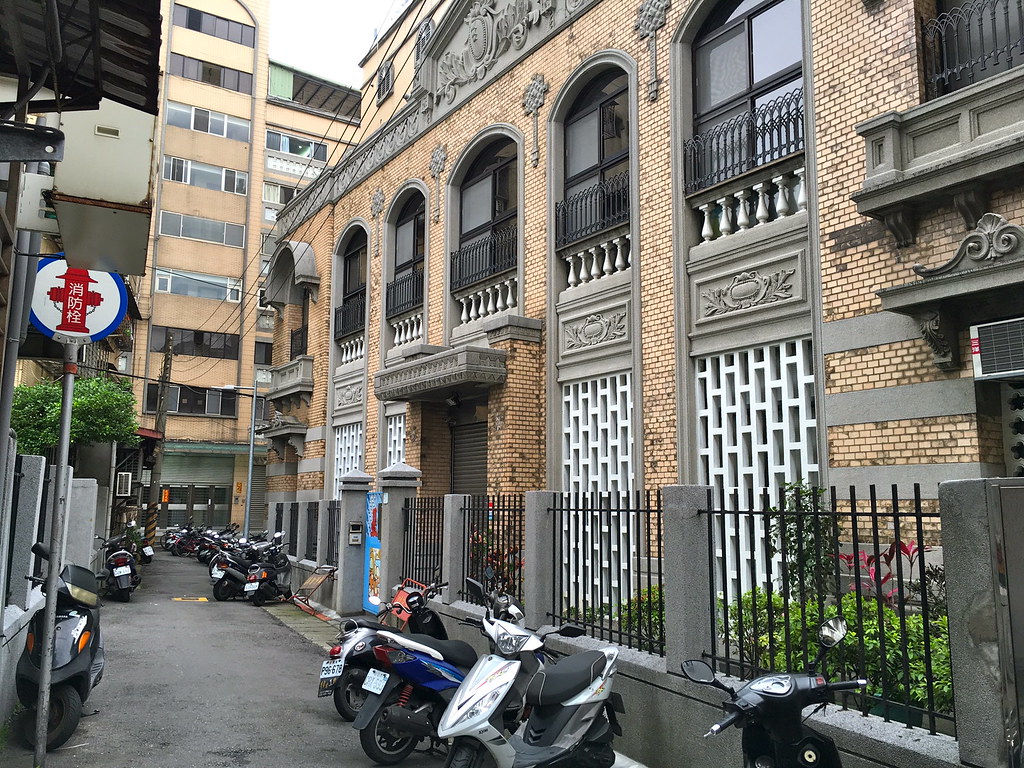
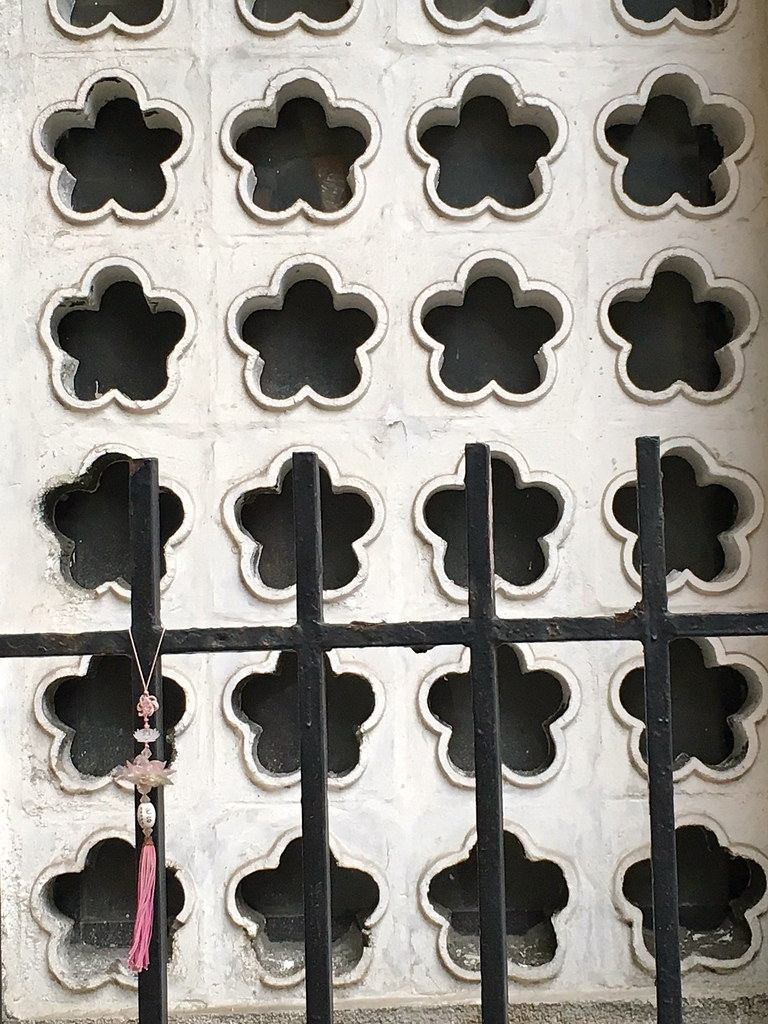
Along the way, the walk is a veritable choose-your-own-adventure of crumbling architecture. Dihua Street of course holds many of the best-preserved examples, but quite a bit exists along Guisui, Guide, Ganzhou, Anxi, Xining, Minsheng, Yanping, Chongqing, and other roads. Just take a wander, See what's out there.
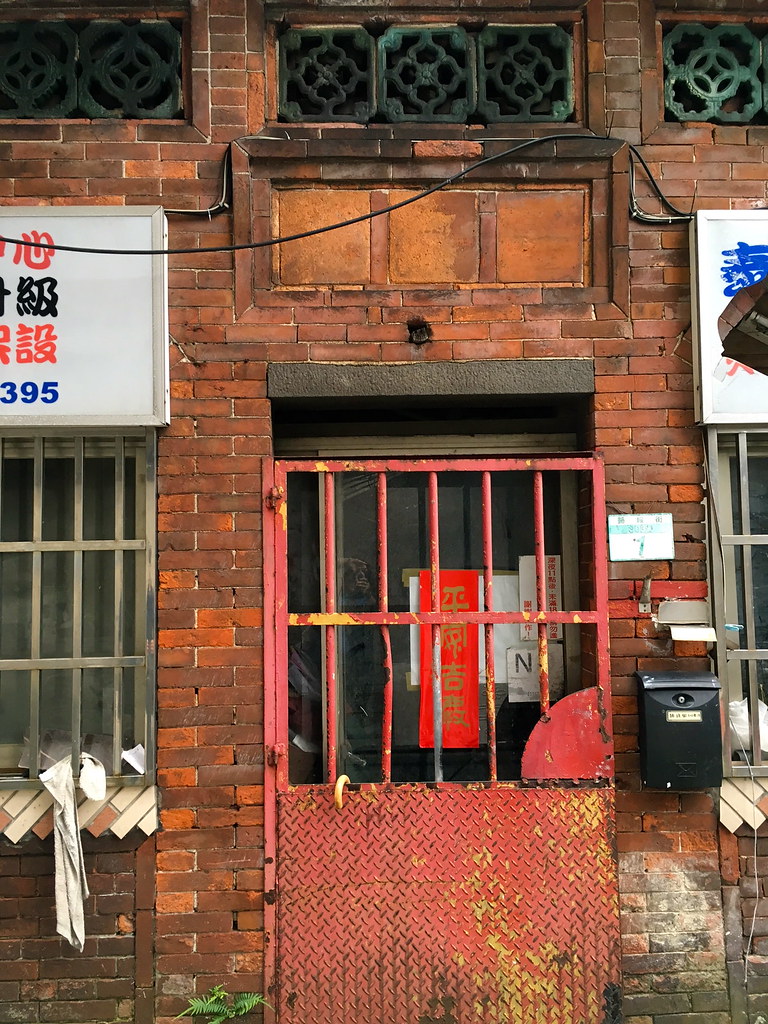
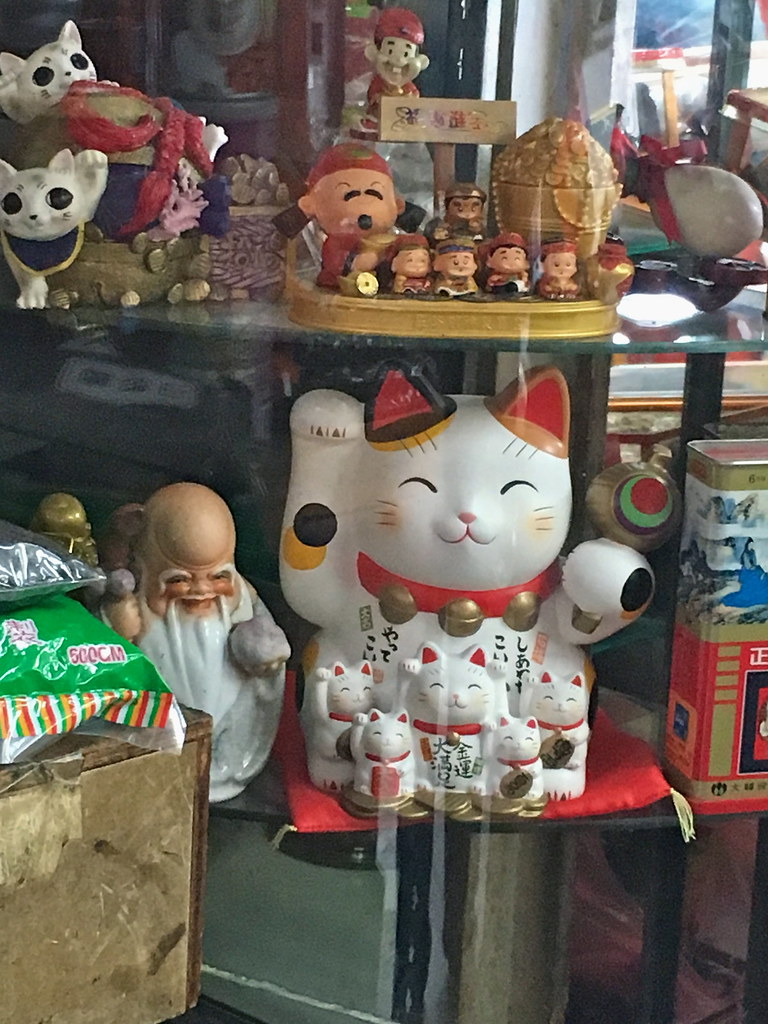
The theater of the lovely little puppetry museum on Xining Road just south of Minsheng:
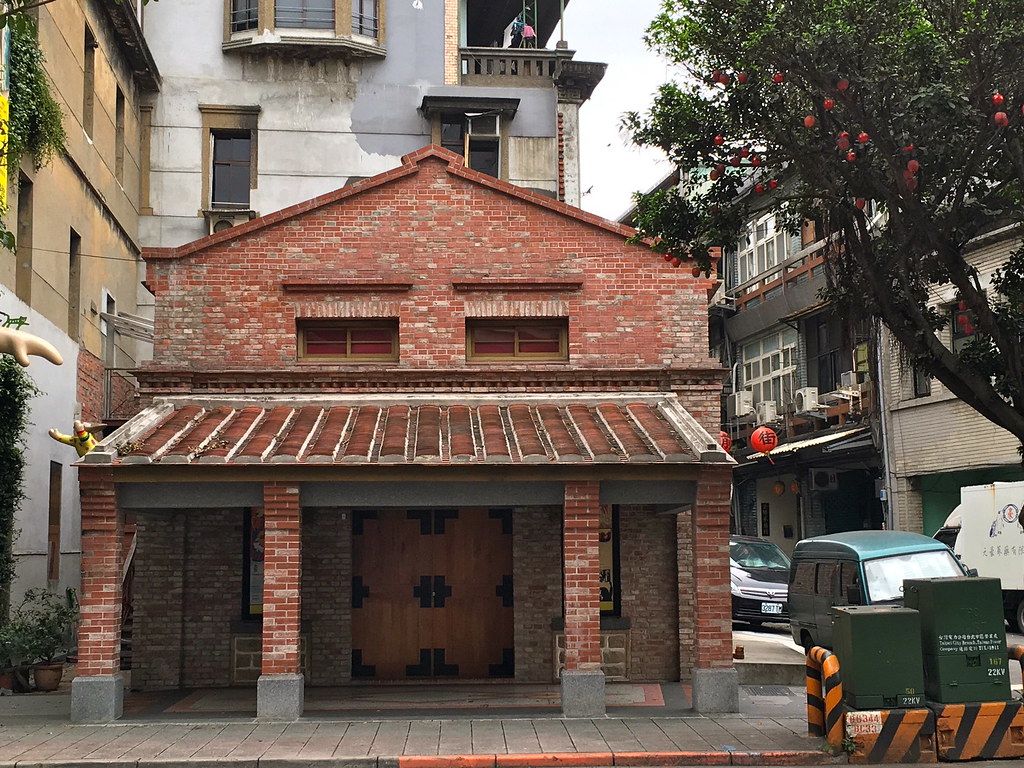
...a falling-apart building on either Minle or Anxi Street:
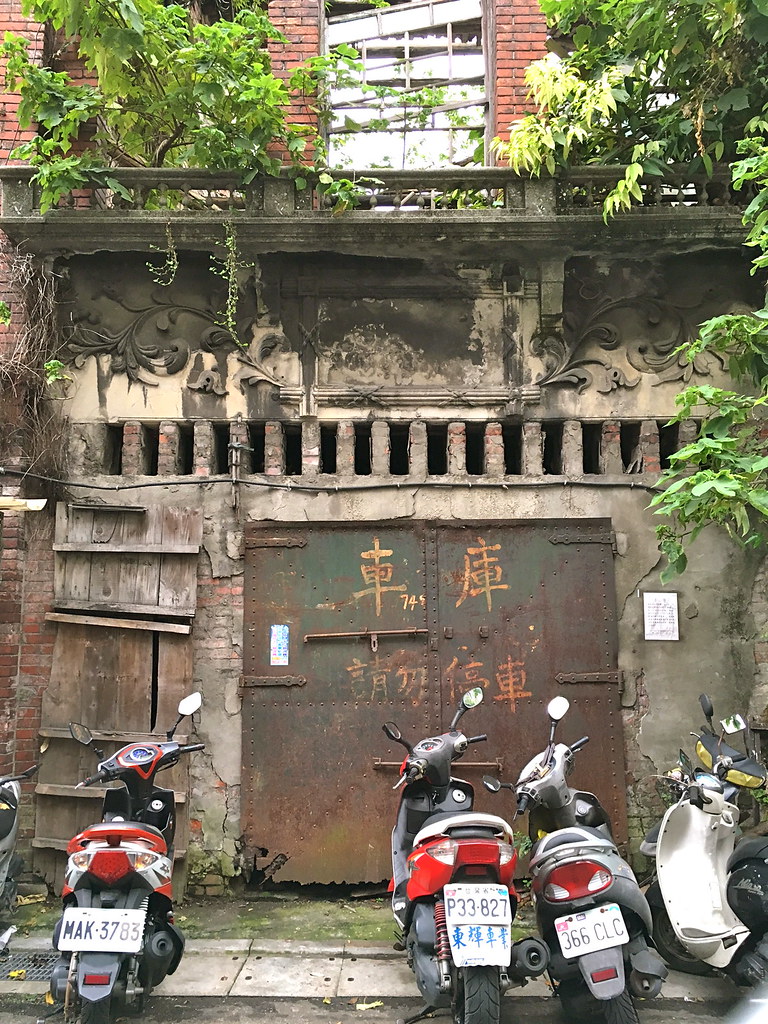
A lane off of Anxi Street:
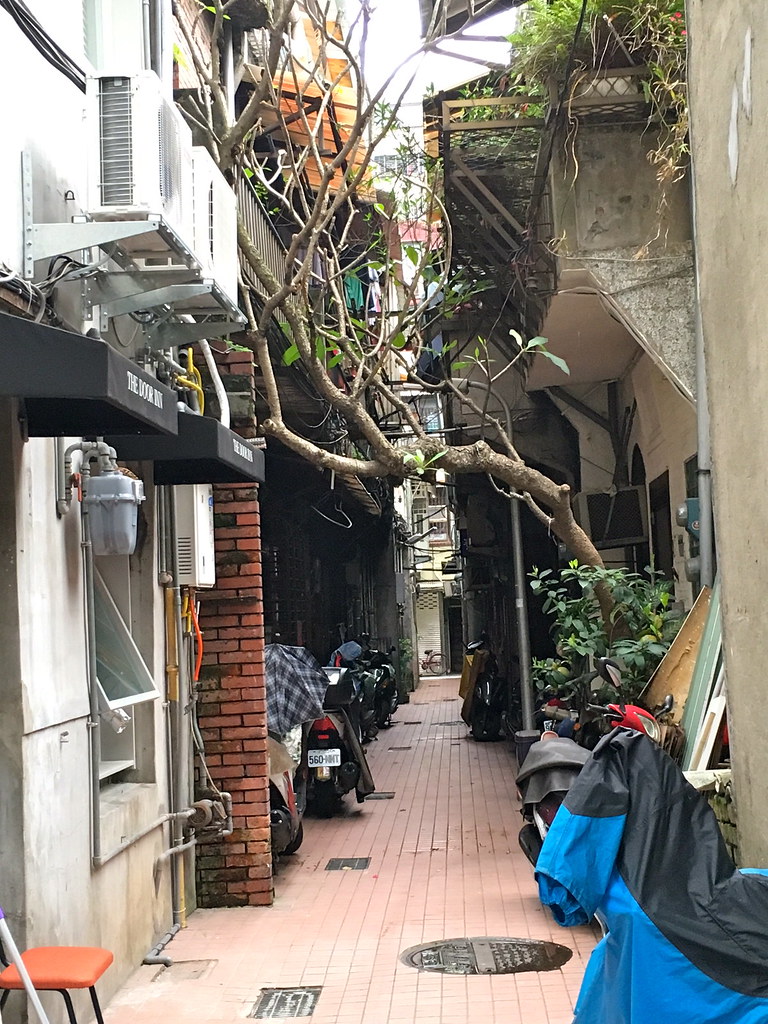
The old Chen mansion, on Guide Street (#73貴德街). The backside visible along Xining over the wall, in a mess of overgrown shrubbery and trees, is creepy in a haunted-house sort of way. You could probably keep a hermit in there.
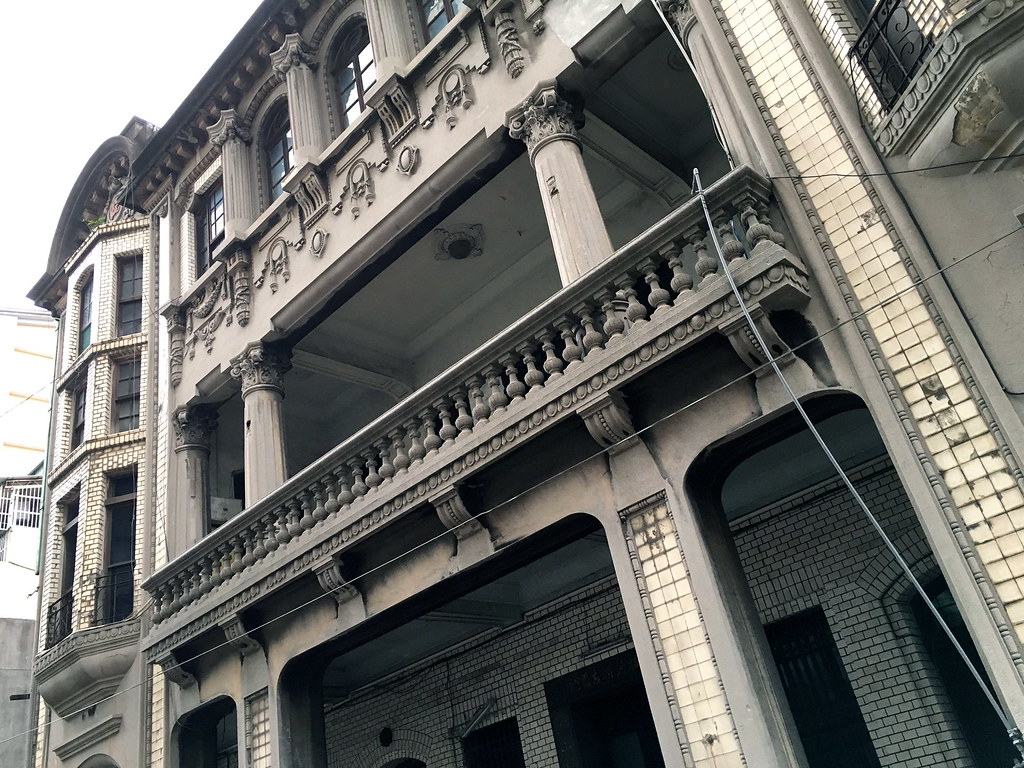
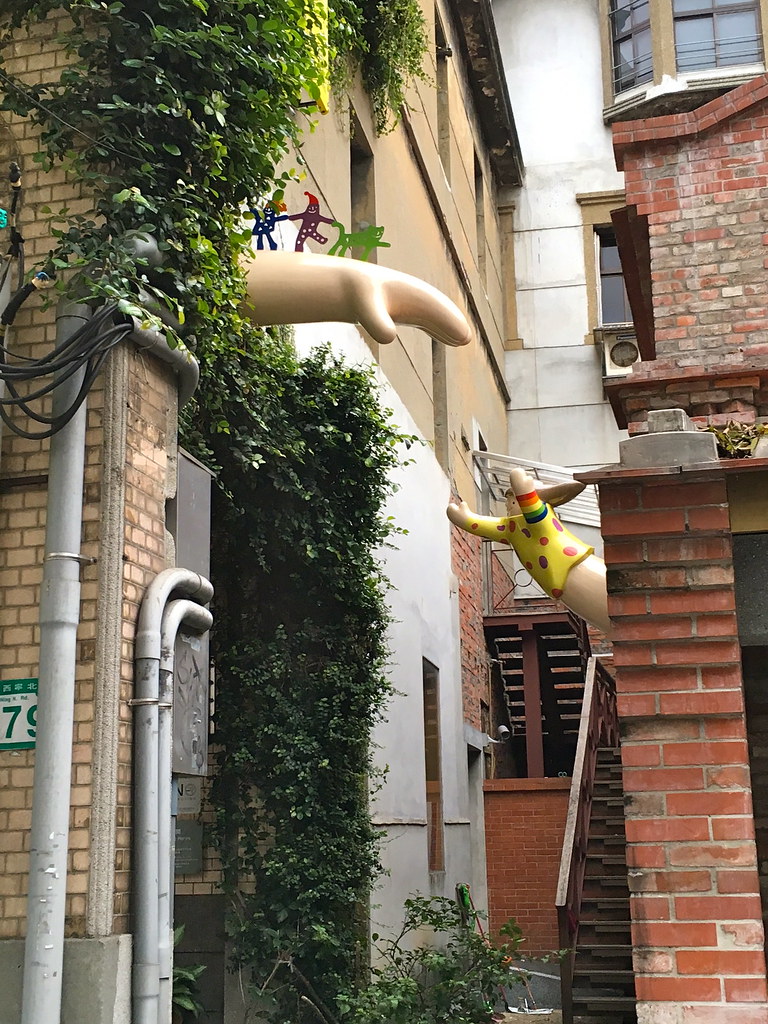
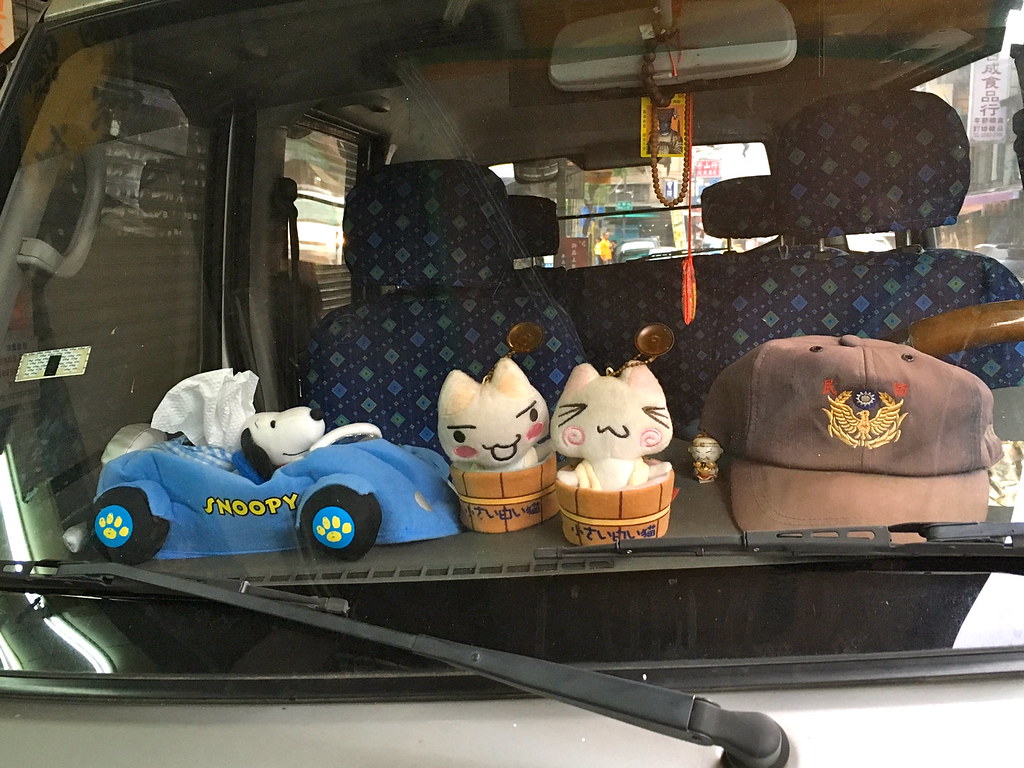
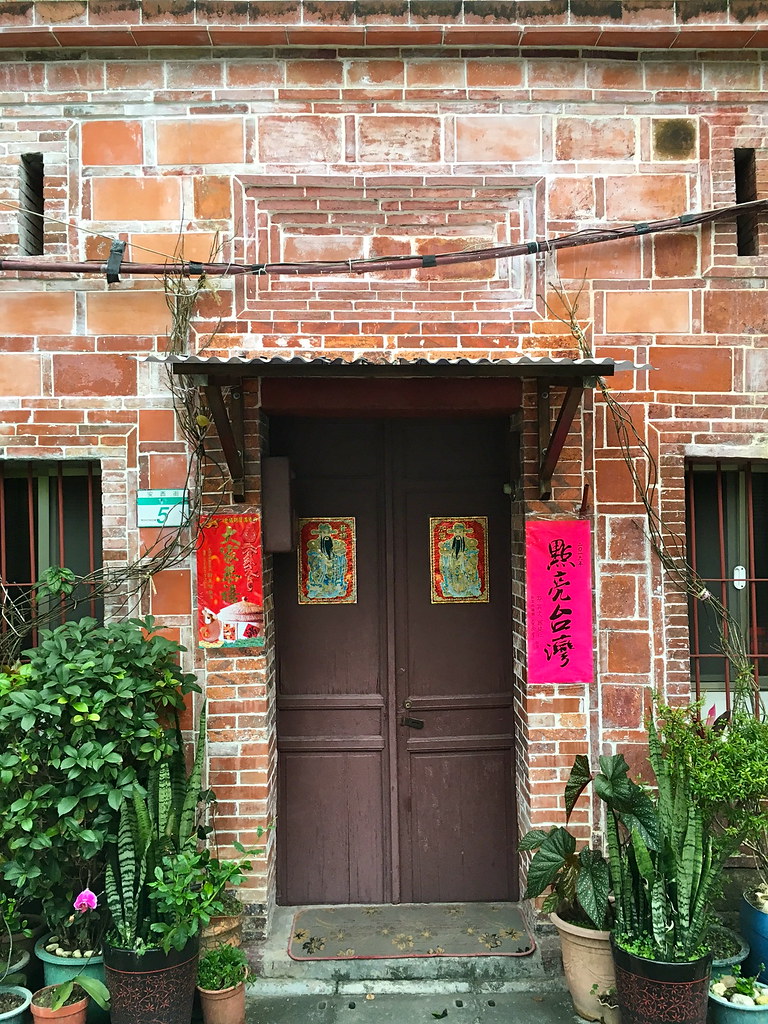
An old house along the park where Anxi and Minle meet above, and a crumbling edifice on Anxi below.
This whole area, especially the park to the east of Dihua Street where these roads meet, is starting to show the early signs of gentrification, with cafes and bookstores beginning to pop up.
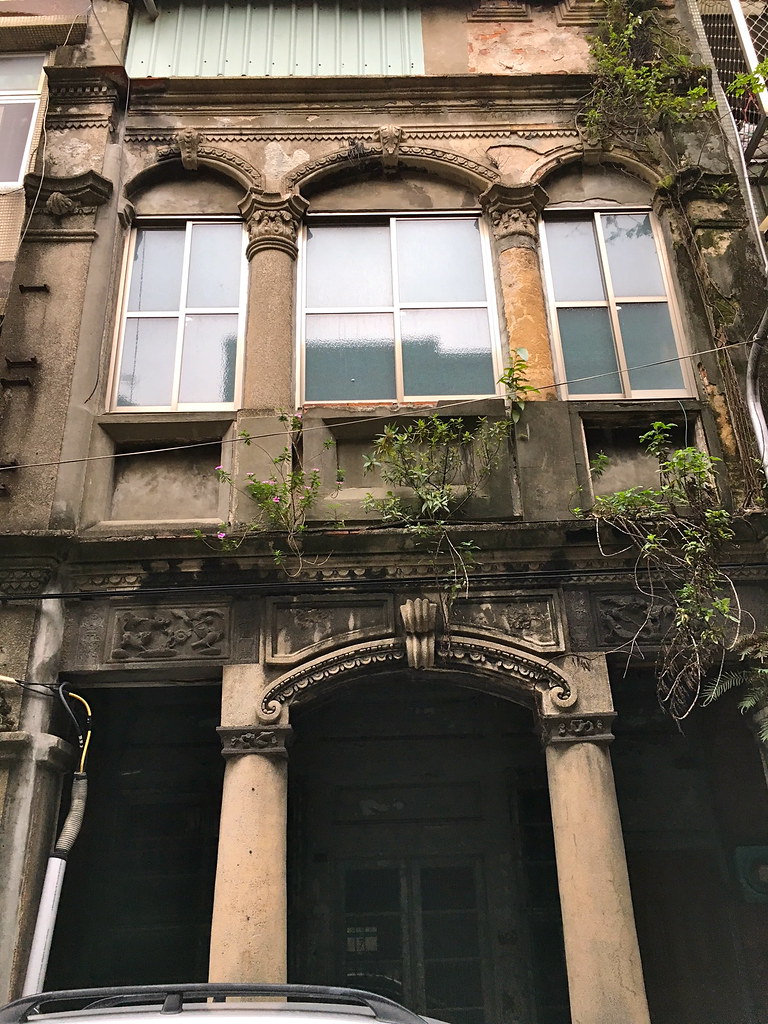
Gentrification, to my mind, is kind of okay as long as local residents benefit (though usually they don't), though I have to say it's a bit of a shock to see my old walking grounds, where I was the only non-neighborhood local around, just me and some old folks and kids, now being full of walkers and tourists on a Sunday afternoon. I'm OK with economic development and all, it's just...weird. At least it means these old architectural treasures are more likely to be preserved. If they draw crowds they're not as likely to be razed by developers. As long as they don't turn into some crappy uniform "Old Street" selling the same shoddy souvenirs as Daxi and Sanxia...
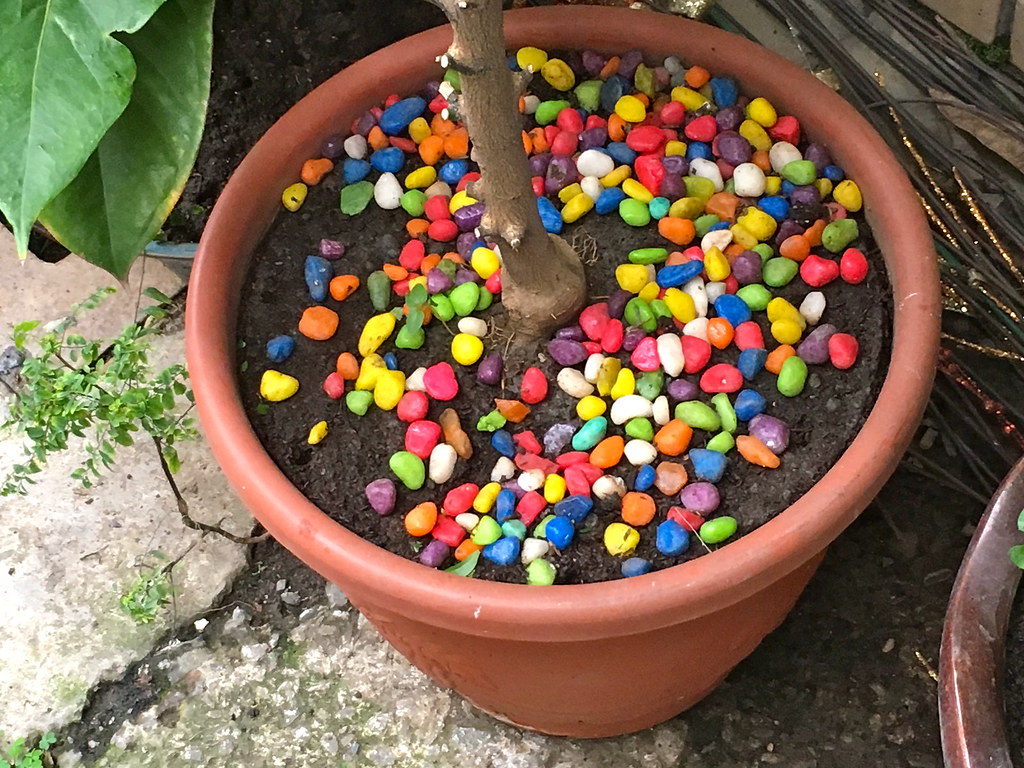

We ended the day by being tourists ourselves, stopping at 217 Manor (in a block of old gray shophouses on Dihua Street north of Minsheng) for coffee to perk up and then a beer to wind down.
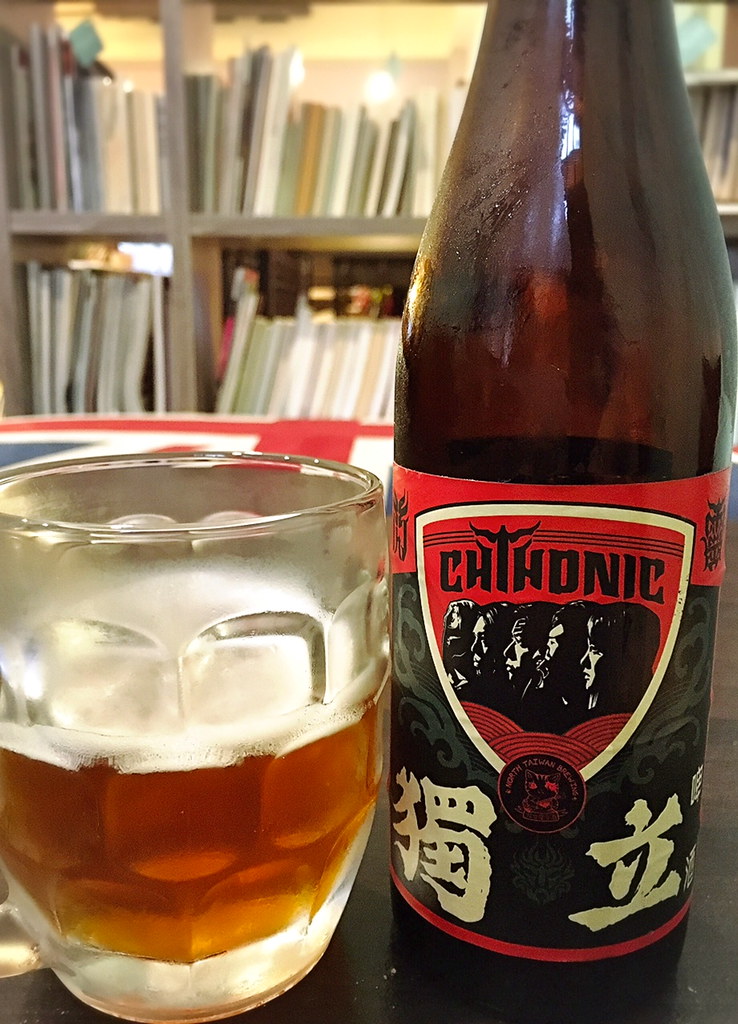
Independence indeed!
And then walked down to Nanjing Road to catch transportation home, stopping along the way in my favorite Chinese medicine pharmacy to play with one of their many pets (they also have another cat, an overweight dog and a surly gray parrot).
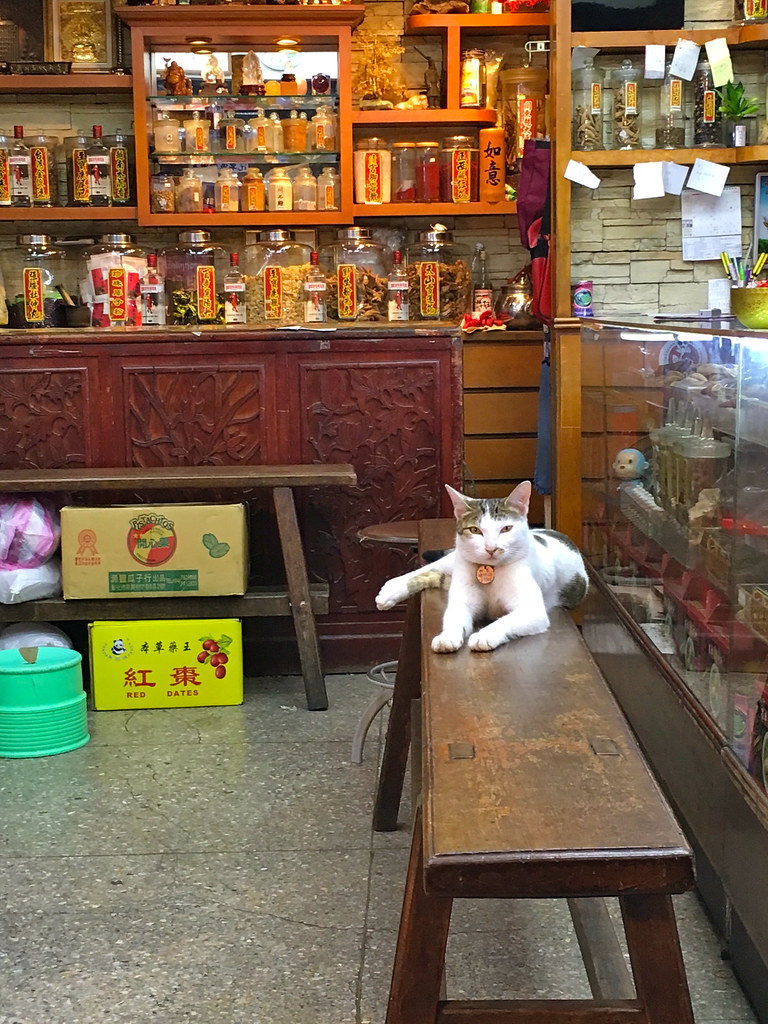

Hello, I've been reading your blog for a short while and I'm a very big fan of everything your put on here. Unfortunately, I haven't been able to find the 2-volume book you refer to in this post, "Historical Sights in Taipei." I can't find it online and I didn't see it in the list of books you've provided on your site. Would you be able to provide the ISBN or maybe the publisher so I might find it? Thank you for your blog!
ReplyDelete